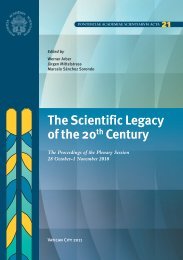Il natural desiderio di sapere - Pontifical Academy of Sciences
Il natural desiderio di sapere - Pontifical Academy of Sciences
Il natural desiderio di sapere - Pontifical Academy of Sciences
Create successful ePaper yourself
Turn your PDF publications into a flip-book with our unique Google optimized e-Paper software.
ON THE NATURAL DESIRE FOR KNOWLEDGE 153These are certainly parts 124 <strong>of</strong> much utility, and <strong>of</strong> very much somewhich, in proposal 125 not believed, in fact turn out to be totally stupendous;it is enough to name the telescope alone, that adds so much to ourvision and brings us so much closer to the stars and the remotest thingsin an instant, which, not only <strong>di</strong>scovered in Padua by the most learnedGalilei, but also elevated and perfected even to celestial use, as soon as heheard talk <strong>of</strong> it from Holland, made it be known and at the same timeremembered that Porta, not without some basis, had already speculatedabout it and pre<strong>di</strong>cted marvelous effects for it, and that that which thenappeared to be fabulous, later actually happened to be much moreadmirable, appreciated by all and most useful in application in observations,government, and war.Also to be had from these, 126 in ad<strong>di</strong>tion to inventions, are the fruits <strong>of</strong>heroic and virtuous actions, in the service and pr<strong>of</strong>it <strong>of</strong> their superiorsand elders, I say, in peace, in war, and in every con<strong>di</strong>tion. These alwayscome from virtue and from the perfection <strong>of</strong> souls well supplied with science,both spontaneously and upon the command <strong>of</strong> those who can, 127 inevery sort <strong>of</strong> honored business. Nor should anyone object, and for thisquit studying, that letters are an impe<strong>di</strong>ment to the military pr<strong>of</strong>ession,since it will always be shown to him that not only are they <strong>of</strong> the greatesthelp, but also totally necessary to those in command, and in our particularwork fully; in the meantime he should keep well fixed in his memoryEpaminondas, Alexander, Caesar, Scipio and recall how long Archimedesalone, although so very abstract in his contemplation that, in order to notbe <strong>di</strong>verted from pulling his lines he lost his life, 128 kept at bay, defen<strong>di</strong>nghis country, Marcellus and the Roman army.By these fruits <strong>of</strong> inventions and actions may be left confused thosewho judge the speculative sciences to be useless and reproach philosophyfor this as indolent and fruitless, so that, this concept once foolishly had,it remains abandoned; and from them 129 may the world take this furthergood, to become enamored <strong>of</strong> these sciences so as to embrace it 130 all the124 Fruits.125 On paper.126 Probably a reference to subjects, masters, and <strong>di</strong>sciples.127 Virtuous actions are spontaneous or consequent to the commands <strong>of</strong> those whohold power, but they always come from the virtue <strong>of</strong> the soul that possesses science.128 The famous episode recounted, among others, by Plutarch, Life <strong>of</strong> Marcellus, 19, § 8ff.129 These fruits.130 Philosophy.
















